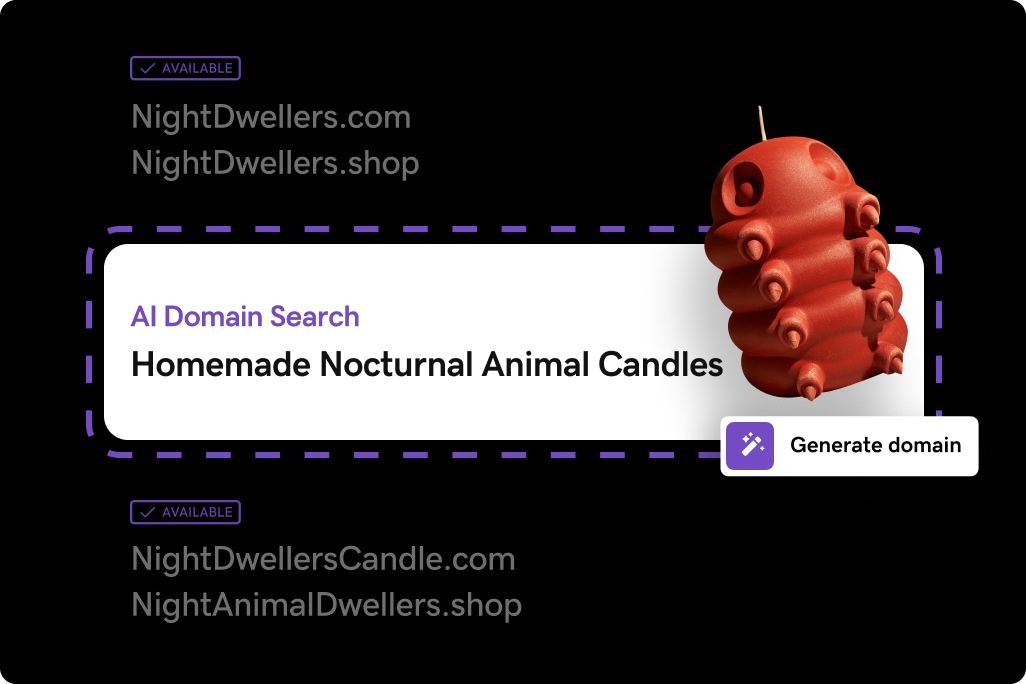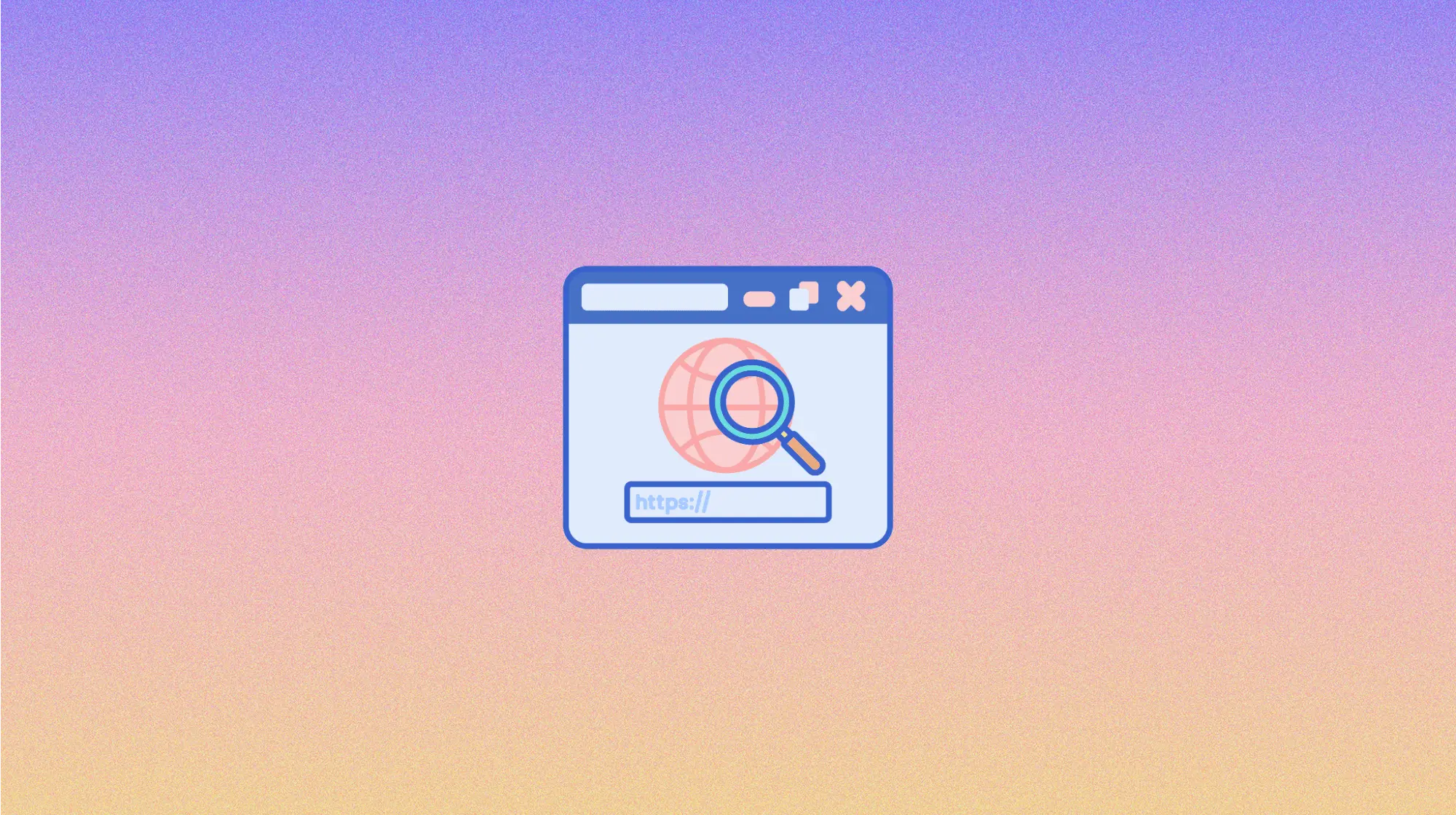If you’re looking to start an online venture, securing a domain name is ground zero. Whether or not you already have an established business, you can’t make a stand on the internet without a domain. But how much does a domain name cost?
How much time should you spend looking for one? What are your options? Fortunately, we’ve got some answers to help steer you in the right direction.
Related: What is a domain name?
Launch your business in minutes with GoDaddy Airo™
How much does a domain name cost?
Generally speaking, domain names cost between $10 and $20 per year to register. However, prices can vary depending on factors like the domain extension and availability. Keep in mind that renewal fees may be higher than your initial registration cost, so it's important to check renewal prices before committing.
Newer domain extensions, such as .app, and .ai, might be on the higher end of that scale or even higher, as they've recently become available. Premium domain names—short, memorable domains that are in high demand—can cost significantly more.
The most expensive domain names will be the ones available on auction houses, through aftermarket services or private sellers.
There are no definitive prices for domain names in these avenues. The business of buying and selling domains means that prices vary widely. The only way to know is to visit sites like Afternic or GoDaddy Auctions to get a feel for the cost. You can learn more about the entire process of selling a domain in this guide.
Pro tip: If you’re looking to purchase a domain that someone else already owns, check out GoDaddy’s Domain Broker Service. Let the brokers handle the nitty-gritty of negotiating so you can own the domain your business deserves.
Are there any hidden costs of a domain name?
Domain names require an annual renewal. Most domain names have an annual fee, along with a small ICANN fee (although not all domain extensions will include that fee). Privacy is an additional feature that can be used with many domain extensions, which is meant to keep your registrant information out of WHOIS searches.
Other associated costs can include bulk purchases, domain protection, and additional services like business email, web hosting, and SSL certificates. SSL certificates are essential for securing your website with data encryption and building customer trust. Adding an SSL certificate may increase the total cost of owning a domain, but it's a worthwhile investment for your online presence.
What affects the cost of a domain name?
Ever wondered why some domain names cost more than others? Let’s break down what shapes those price tags:
- The domain extension (i.e., .com vs. .shop vs. .tech): Popular extensions like .com often cost more than newer or niche extensions.
- Where you purchase the domain name from (i.e., a reputable registrar, an aftermarket service, a private seller, etc.): Prices can vary between registrars, so it's wise to compare options.
- The term length and popularity: Short, memorable domain names tend to be more expensive due to high demand.
- Add-ons you select: Registering for multiple years and selecting additional features like privacy protection can affect the overall price.
- Availability: If the domain you want is already taken, purchasing it from the current owner or through a domain aftermarket can increase the cost.
How much does a premium domain name cost?
Premium domain names are already registered and are up for sale on a domain aftermarket service. Depending on the current demand, the price for premium domain names can vary widely, ranging from a 3-figure number to a 7-figure number.
How can you get a premium domain for a good price?
Securing a good deal on a premium domain name is straightforward if you know where to look.
- Consider looking for sales, promotional offers, or introductory pricing.
- Be aware of renewal fees, as initial prices may differ from renewal costs.
- Consider exploring less popular domain extensions.
- A .io domain could be a good fit for a tech company, while .shop or .store might suit an ecommerce business.
These alternatives might be more affordable and still align with your brand.
How do I pick a domain name?

When it comes to choosing a domain name, there are a few things to consider:
Incorporate keywords
What’s your business about? Are you selling T-shirts online or do you make handmade jewelry? Maybe you sell services instead of goods — that’s OK, too. You might try something like:
- SmithsButtonShop.com
- LightWeightShirts.shop
- UniqueWeb.design
Whatever you do, research keywords by using a tool like Google Keyword Planner and see what your target audience is searching for. Then, if you can, incorporate one into your domain name.
Avoid hyphens or odd spellings
How often do you use punctuation when searching for something online? My guess is rarely. The last thing you want is a domain name that requires extra effort from your visitors. Using something like, the-best-shirts-youll-ever-wear.com — no matter how compelling — won’t do you any favors.
Stay away from domains with hyphenations or odd spellings to make it easier for people to find you.
When possible, avoid using uncommon spellings or numbers. Is that a 4 or a four? What about 2, to, two, or too? You catch my drift. If anyone ever shares your domain via word-of-mouth, your name could get lost in translation.
Make it memorable
There are nearly 1.7 billion websites live on the internet right now. How are you going to make yours stand out?
For starters, you’ll need a domain name that’s memorable. Use something that speaks to your brand or the services and products you offer. Make sure it rolls off the tongue nicely, and definitely run your ideas by friends and family.
Once you decide on a domain, you’ll need a website, you can’t have one without the other, and since we’ve been talking about costs, building a website is not the pricey endeavor some people image it is, we’ve broken down how much it costs to build a website in this short guide.
If you're looking to learn what a domain extension is, our resources can guide you through the essentials while you explore domain options. For help in choosing a great domain, try out our AI domain name generator; it will provide you with a list of excellent domain names in just minutes.
Your new domain will also include GoDaddy Airo , our AI-powered solution that instantly creates your website, logo, email, and more.
Choose a scalable domain that aligns with your long-term vision
When selecting your domain name, think about your business's future growth and expansion plans. A domain name that aligns with your long-term vision allows your brand to evolve without limitations.
By choosing a scalable domain, you avoid the need for costly changes or rebranding efforts down the line. For instance, if you plan to expand your product line or enter new markets, selecting a domain name that encompasses your broader business goals will serve you better than one that's overly specific.
This approach ensures that your domain remains relevant as your business grows and diversifies.
Do I need more than one domain?

Short answer, yes. Even if you only plan to launch one website, the answer is still yes. Let me tell you why — brand protection.
Owning multiple variations of your domain name accounts for accidental misspellings and encroaching competitors.
Remember the odd spelling examples we mentioned above? Even if you decided to opt with an easier version of your name, the true domain could still get misinterpreted.
If you secure common errors, you can cover all your bases and still point each domain name to the primary site. Now, traffic that wants to find you will actually make it to your site, regardless of errant typos.
And, perhaps on a grander scheme, owning multiple domain names protects your business from mooching competitors.
If you own BestCookies.com and are widely known for your grandmother’s chocolate chip recipe, you might find competitors eager to snag BestChocolateCookies.com. Now, when foodies everywhere take to the internet in search of your goods, they could end up on someone else’s site.
If you have it in the budget, consider purchasing domain names pertinent to your brand (even if they’re not immediately recognizable as your business’s name) to keep competitors off your traffic.
Are you asking the right questions?
Instead of asking yourself, “how much does a domain name cost,” you should be asking, “how much would it cost my business not to have a domain that matches my brand?”
It isn’t always easy to find an available domain name that aligns with your company. But the cost of sacrificing immediate recognition, traffic and sales could easily outweigh the price of a domain. Whether you’ve found an extension that fits or you’re in need of a broker, don’t wait to register your domain.
*AI-assisted full website including all of the premium features like online store, appointment scheduling, and marketplace selling to name a few, requires paid subscription.
Social media marketing calendar available with GoDaddy Airo, some features will require paid subscription.
Professional Email through Microsoft Office 365 30-day free trial with an option to renew into a paid subscription beyond the promotional period.
While the LLC starter plan is free, there are likely some state and/or local filing fees associated with your filing which will be determined during the filing process.







